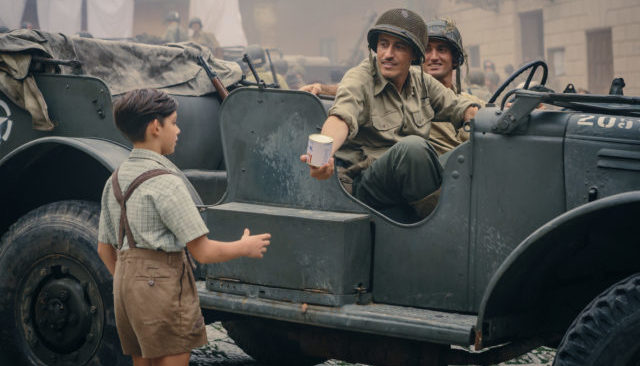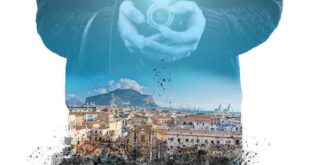Another successful edition of Open Roads: New Italian Cinema is underway in New York City. Now in its 17th year, the annual series is going strong with numerous award-winners along with some unique independent films. The series, which runs until June 7, is a group effort by the Film Society of Lincoln Center, Istituto Luce Cinecittà, the Italian Trade Commission and the Italian Cultural Institute New York; Casa Italiana Zerilli Marimò—NYU not to mention the tireless champions of Italian cinema who have been with this festival since the beginning- Antonio Monda, Griselda Guerrasio and Monique Catalina.
One of the highlights of the 17th edition is the North American premiere of “In guerra per amore” (At War with Love) by Pierfrancesco Diliberto (Pif) in which he plays the role of Arturo Giammarresi, a young Sicilian living in New York. When he falls in love with Flora (Miriam Leone), he realizes the only way to outdo her mafia-connected finance is to travel to Sicily and ask for her dying father’s permission to marry her. The only problem is that Europe is in the trenches of World War II and the only feasible way of reaching Flora’s father is by traveling there as a soldier. What follows is a funny and wild but always poignant adventure into war torn Italy with a whole cast of characters that make this film an absolute joy to watch. Some noteworthy performances are by Andrea Di Stefano in the role of Philip Chiamparino, a devoted and respected captain and Domenico Centamore as Tonino, the goofball assistant to the local Sicilian mafia boss Don Calò, played with a brilliantly subtle sense of humor by Maurizio Marchetti.
Private Giammarresi’s journey back home uncovers something most people know nothing about- the American influence on the rise of the Sicilian mafia. In the film, U.S. government officials ask Italian-American mobster Lucky Luciano for connections in Sicily that could help the allied forces take control of the region. This storyline story focuses on Philip Chiamparino (Andrea Di Stefano), a good-hearted army captain not comfortable with the orders he has been given, knowing he’s putting power into the hands of criminals. It was captivating to watch the situation unfold, having never known this part of history. At the end of the film, actual documents are revealed to prove the resurgence of the mafia following the allied occupation and solutions offered by one American captain to counter that resurgence. Unfortunately, his suggestions fell on deaf ears.
I spoke with Pif at Lincoln Center and asked him specifically about this film. He also addressed my curiosities about the Sicilian mafia in general speaking to its rise in America at the turn of the century as immigration was reaching its height. We also talked about the differences in the ways and protocol of the mafia in Sicily and its counterparts here in the United States. He spoke with the same irony and sense of humor that he uses in his films, which I find fascinating because although he likes to laugh at some of the ridiculousness of the mafiosi, his sadness for what organized crime has done to his people is always present.
Why did you want to make this story known?
No one has every really told this story. Before writing the film, I did some research to see if there had been any films either in the United States or in Italy that were focused on the arrival of the allies in Sicily and I didn’t find anything in either place. It’s a shame because this is really fundamental for Italy and for the future of Italy. It changed the direction in which we were going and I’ll be forever grateful to the allies for having liberated Italy from Nazism and fascism but in doing so, they utilized the mafia. First they used the mafia against fascism and Nazism and then they used the mafia against communism, which sort of legitimized them in what was an emergency situation.
What did your research involve?
Well I’m not a historian but what I have done is I’ve basically endorsed pieces of various historians. There are those that deny this part the mafia played in helping the allies but I have absolutely no doubt about it. It’s not that we need written documentation of it, like Roosevelt signed some kind of presidential order. There are plenty of witnesses and a certain logic to the involvement of the Sicilian mafia in helping the allies to defeat fascism and Nazism. At the end of the film, there’s a short document that I show by an American officer Scotten who spoke in an extremely lucid way about what was happening. He talks about how the presence of the mafia since the arrival of the allies has become even stronger in the area and as a result, people are beginning to distrust the allies. In it, he questions what can be done about this. He says, ‘Either we can ally ourselves with the mafia and allow it to continue or we should try to limit its excessive power.’ And the risk of doing this is that then you will legitimize the mafia. He warns against this. And again this is something that is coming from an officer of the American army talking about the danger of allowing the mafia that kind of free reign. In this, the Americans have made a mistake they have repeated in Syria most recently but also in Afghanistan where they decide that the enemy of their enemy was going to be their friend. I’d like to quote the example of Rambo 3 which on Rambo goes to Afghanistan in order to free his commanding officer who is being held by the Soviet Union. In order to do that, he looks for help from the Mujahideen and let’s remember that when Rambo goes back home, the Mujahideen had a kind of internal division and part of them went on to become the Taliban. In other words, the message is this- that in order to do good, you should not look for help from the evil because evil is always going to want payback.
Let’s talk again, because we also did back in 2014, about the differences and stereotypes between the Sicilian mafia and its American version.
I think there’s been a huge kind of misunderstanding about the mafia through films. The Godfather by my colleague Frances Ford Coppola is a beautiful film. I’d give my eye teeth to make a film like that. It represents an American mafia in the 1950s, a mafia that is Sicilian in origin but is Italian-American. There is a very big difference between that kind of romanticized mafia and the Sicilian mafia, which is much less cool. For example, when Provenzano, the boss of the bosses was arrested, he was arrested in a barn eating bread and cicoria (dandelion greens). But thanks to Coppola, even the Sicilian mafia fell under the influence of this film. When Bagarella, a relative of Totò Riina, the other big mafia boss, had a wedding in his family, he insisted that the music played at the wedding be the music that was played in The Godfather wedding scene. The funny thing is even the word itself mafia didn’t really exist in Sicily. They called it the Cosa Nostra. But the film had such a huge influence on the Sicilian mafia itself, which is dazzled by it and have fallen in love with the myth of the film.
I’m curious about the phenomenon around the turn of the 20th century with so many individual mafiosi in Italian-American neighborhoods. What do you think led to this type of infiltration throughout America?
That’s an area I’m not so specialized in. When we think of who immigrated to the United States, it was a lot of people who were very desperate and that would have included certain criminals. A little later on from the period you’re talking about when Mussolini was in power, Mussolini set out to defeat the mafia under the Prefect Mori. At that time, members of the Sicilian mafia claimed they were going to leave saying that they were anti-fascist but that wasn’t really the truth. Then Mussolini declared that the mafia had been defeated for once and for all. However, the thing is that when the mafia came to the United States, it was also very much transformed. The problem here was very different. The United States mafia was specialized more in corruption. They would not have dared to do what the Sicilian mafia was doing, which was to declare war on the state by killing, by assassinating policemen and judges. Let me just tell you about a little episode that is kind of funny in talking about the differences between the Sicilian mafia and American or Italian-American mafia. Look at the case of Giovanni Brusca who was responsible for many assassinations, he’s the one who sort of pressed the button that set off the bomb that killed Judge Falcone. He was wanted by the Italian police, so he escaped to the United States and tried living with the American mafia for a while and he was so shocked by what he found. He said that he just couldn’t believe how publicly the members of the American mafia would just say that they were Mafiosi and how they’d go to dinner with their lovers. He found it extremely embarrassing. Maybe the Sicilian Mafiosi are kind of hypocritical but they would never have a lover or at least not so openly and they’re very much into their secrecy. At a certain point, he just got up and left.
Chances are good “At War with Love” will become available in the United States. His previous film “The Mafia Kills Only in the Summer” was made available on Netflix and is currently available through Amazon.
 Fra Noi Embrace Your Inner Italian
Fra Noi Embrace Your Inner Italian







